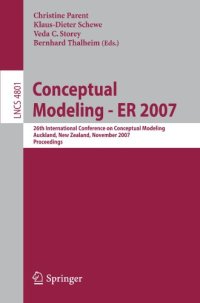
Ebook: Conceptual Modeling - ER 2007: 26th International Conference on Conceptual Modeling, Auckland, New Zealand, November 5-9, 2007. Proceedings
Author: Egon Börger (auth.) Christine Parent Klaus-Dieter Schewe Veda C. Storey Bernhard Thalheim (eds.)
- Genre: Computers
- Tags: Database Management, Information Systems Applications (incl.Internet), Mathematical Logic and Formal Languages, Artificial Intelligence (incl. Robotics), Models and Principles, Software Engineering
- Series: Lecture Notes in Computer Science 4801 : Information Systems and Applications incl. Internet/Web and HCI
- Year: 2007
- Publisher: Springer-Verlag Berlin Heidelberg
- Edition: 1
- Language: English
- pdf
Conceptual modeling is fundamental to the development of complex systems, because it provides the key communication means between systems developers, end-usersandcustomers.Conceptualmodelingprovideslanguages,methods and tools to understandandrepresentthe applicationdomain;to elicitate,concep- alizeandformalizesystemrequirementsanduserneeds;tocommunicatesystems designs to all stakeholders; to formally verify and validate system designs on high levels of abstractions; and to minimize ambiguities in system development. Initially, conceptual modeling mainly addressed data-intensive information s- tems and contributed to data modeling and database application engineering. The area of conceptual modeling has now matured to encompass all kinds of application areas such as e-applications (including e-business and e-learning), web-based systems (including the semantic web and ubiquitous systems), life science and geographic applications. The annual International Conference on Conceptual Modeling serves as the premiere forum for presenting and discussing researchand applications in all - eas associatedwith conceptual modeling. This year,the Call for Papers solicited contributions dealing with logical and philosophical foundations of conceptual modeling, information modeling concepts including ontologies, correctness in modeling, web-based and mobile information systems, semi-structured data and XML, information and database integration, information retrieval, organization andevaluation,designmethodologiesandtools,reuse,re-engineeringandreverse engineering, quality assurance in conceptual modeling, conceptual change and evolution, data warehousing and data mining, spatial and temporal modeling, business process and work?ow modeling, knowledge management, requirements elicitation, and advanced applications.
This book constitutes the refereed proceedings of the 26th International Conference on Conceptual Modeling, ER 2007, held in Auckland, New Zealand, in November 2007.
The 37 revised full papers presented together with 3 keynote lectures were carefully reviewed and selected from 167 submissions. The papers are organized in topical sections on data warehousing and data mining, design methodologies and tools, information and database integration, information modelling concepts and ontologies, integrity constraints, logical foundations of conceptual modelling, patterns and conceptual meta-modelling, requirements elicitation, reuse and reengineering, semi-structured data and XML, as well as Web information systems and XML.